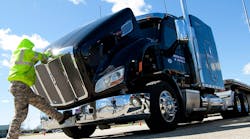As of April 7, 27 states have closed their State Driver Licensing Agencies (SDLA), while the remaining 23 states operate on a limited basis. With the trucking industry accountable for moving 71% of all freight across the country, the supply chain relies upon new commercial drivers.
According to Don Lefeve, president of the Commercial Vehicle Training Association (CVTA)—the nation’s largest association of commercial truck driving schools—the closure of these agencies leaves many future drivers unable to obtain commercial learner’s permits (CLPs) and commercial driver’s licenses (CDLs). Abruptly halting the process of getting 25,000-40,000 new truck drivers trained, licensed, and on the road impacts several significant industries and the nation’s supply chain.
In efforts to raise legislative awareness, CVTA led a coalition of Fortune 500 corporations, major associations and commercial driving schools in sending letters to state governors and congressional leaders, highlighting the growing problem of SDLA closures and the impact this has on the supply chain as a whole.
The U.S. Department of Homeland Security issued guidance officially deems transportation workers to be a critical workforce—including “employees supporting or enabling transportation functions, including truck drivers, bus drivers…”, Department of Motor Vehicle (DMV) employees…”, and those involved in “credentialing, vetting and licensing operations” for this industry.
While this seems like it should have provided clarification that agencies responsible for the issuance of CLPs and CDLs would be considered a part of this, states appear to have conflicting opinions when it comes to considering these national guidelines. With over half of the country’s SDLAs closed and potentially more to come, Lefeve says it is crucial for governors to understand that these decisions don’t just impact an individual state, but the entirety of the nation.
“Commercial driver training schools are working together with participants across the supply chain to facilitate Americans’ access to needed goods and services, including food and critical supplies (like prescription medications) during this pandemic,” Lefeve said. “To avoid truck driver shortages, which are critical to our nation’s response and recovery, it is imperative that state and federal governments work together so CDL schools and SDLAs can remain open to train, test and license new commercial drivers.”
The coalition is proposing that governors need to enact executive orders to recognize CDL training schools and SDLAs as “essential services” while also granting the Secretary of Transportation temporary authority to also administer CLP or CDL testing due to SDLA closure. Timely action on these two requests will help avoid an even larger shortage of commercial truck drivers during the COVID-19 pandemic.
“It’s imperative that individual states recognize the national impact of their decisions to shut down CDL training schools and SDLAs. We need them to specifically recognize that CDL training schools and SDLAs are essential services,” Lefeve said. “Equally important is appealing to Congress to give the Secretary of Transportation the temporary authority to create a pathway for the supply chain to continue. This starts with commercial driver training and licensing.”



